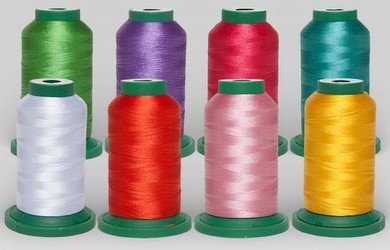A Guide to Types of Sewing Thread at Premier Stitching
25th Sep 2024
Sewing Thread Type Guide
Did you know that there are many different types of thread, each with its own uses and advantages? You've likely come across thread in dozens of colors, but there's more to consider than just the appearance of your final product. Different threads result in products that have distinct feels, stretches and constructions. Part of becoming an accomplished sewer is knowing when to use one type of thread over another.
If you're new to sewing and haven't spent much time thinking about all the different types of thread and their uses, then now is the perfect time to start learning about them. In this sewing thread type guide, we'll explain several common thread types and their uses to help you gain greater confidence as a sewer.
Cotton Thread
We'll kick things off with one of the most common types of thread, cotton. Cotton thread is frequently used in patchwork and quilting projects, and some sewers prefer it for sewing all cotton fabric.
Cotton lacks some of the strength and resilience of other threads. It cannot stretch too far without breaking, which is a major benefit of synthetic threads. But it's great for delicate projects as you typically want the thread to be weaker than the fabric in which it is being used.
Elastic Thread
Elastic is a synthetic material that is designed to be extremely stretchy. In clothing, elastic is most commonly found in waistbands as it can fit a wide range of body types thanks to its flexibility.
When sewing with elastic thread, you'll want to use where flexibility is needed. It's great for sewing waistbands on undergarments, skirts and pajama pants. One thing to keep in mind when sewing with elastic thread is that it will "shrink," or pull, the fabric because of its high tension. Make sure to use additional fabric so that your project does not end up smaller than expected.
Polyester Thread
Polyester thread is the most commonly used type of thread and can be used in just about any type of project. This thread type is ubiquitous because of its moderate amount of give, which means that it can stretch slightly. The light amount of stretch is perfect for knit projects and stretchier fabrics as it provides the necessary structure that these fabrics require. The durability of polyester thread also makes it a reliable go-to for just about any project.
Cotton Perle
Cotton perle, or pearl cotton, is a high-weight, shiny, twisted thread that is most often used for decorative purposes. Some of the most common uses for this type of thread include hand quilting, cross stitch and crochet. It's not often used as a structural thread because of its heavy weight, but it can be used in traditional stitching to add a pop of color and personality to garments.
Nylon
Nylon is an excellent heavy-duty thread type. It has a high degree of strength, making it ideal for stitching heavy materials such as leather and vinyl. It also works well for stitching upholstery, as the frequent use of seating requires thread that will not readily break. Certain types of nylon thread are specially treated to reduce friction when used in a sewing machine. This enables you to make smoother stitches when working at high stitch speeds.
Rayon
Most sewers prefer to use rayon as a decorative thread on their projects. It is beloved for its high degree of luster, which causes it to show up beautifully on any project. Many quilters like to add rayon to the non-structural elements of their quilts. You could even embroider a beautiful jacket using this shiny, eye-catching thread.
Silk
Silk has a reputation for being delicate, so you might be surprised to know that it's actually a rather strong type of thread. Silk is also a great option for high speed stitching. The smooth nature of silk allows it to glide through fabric without leaving many press marks. Some sewers recommend running silk through beeswax, which provides greater strength and prevents pesky tangles.
Wool
When it comes to wool, which is a natural material made from sheep fleece, sewers and quilters typically say that it works best with heavier fabrics. Many quilters and embroiderers are fans of wool for its heavy weight and unique, slightly mottled appearance. Wool can be a bit delicate, so you will have to watch out for breaks more than you would if using a polyester thread. That said, it's hard to beat wool stitching on a snuggly blanket, which is why so many quilters and sewers find themselves drawn towards this unique thread!
Find the Thread You Need for a Price You'll Love at Premier Stitching!
Premier Stitching carries dozens of different thread types from a variety of manufacturers. You can buy thread pre-organized in one of our thread kits, or skip out on the bobbin winding process by purchasing pre-wound bobbins. No matter what thread you need, you're sure to find the perfect material at Premier Stitching. Head to our thread page to find what you're looking for today!



